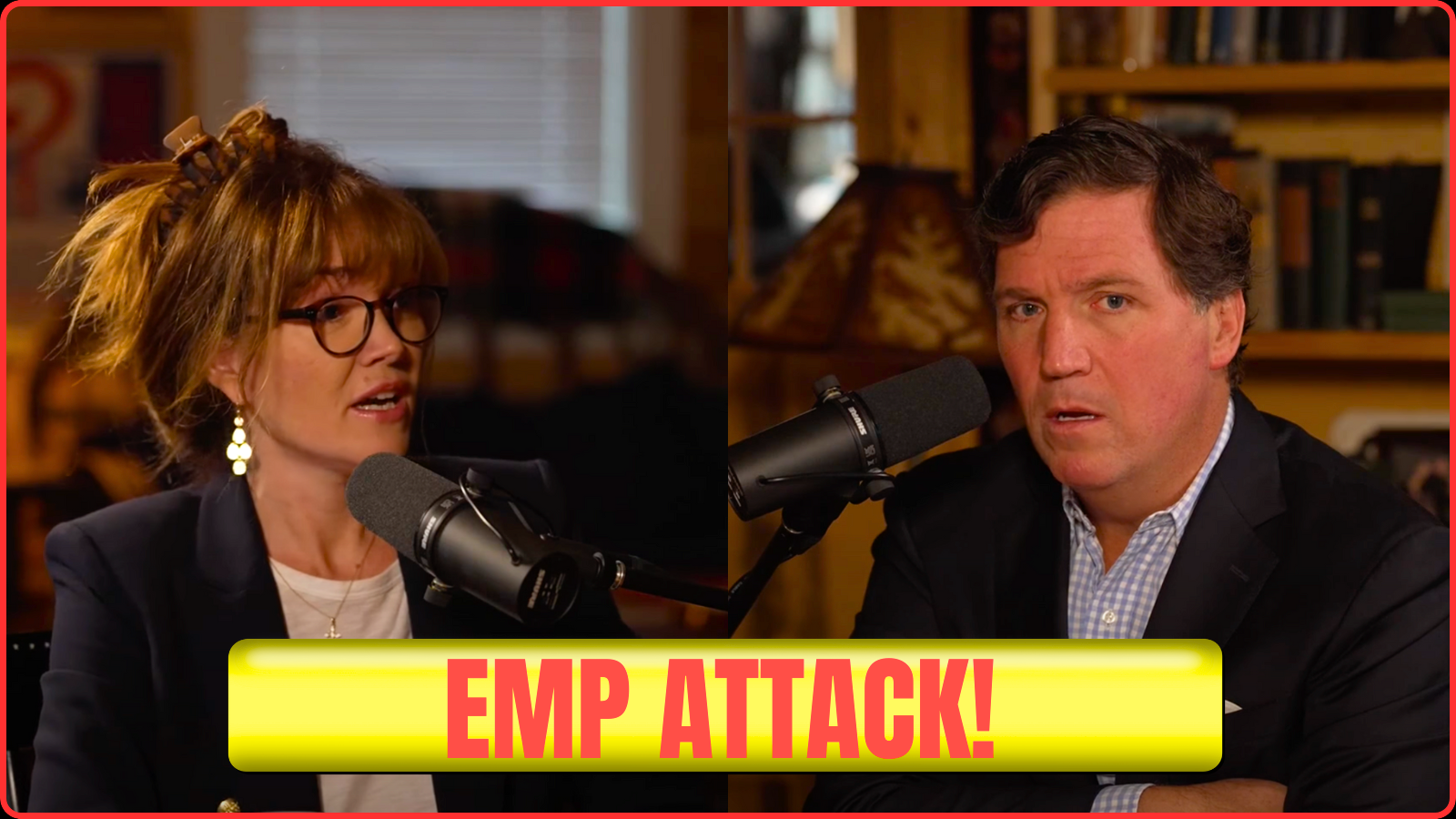Now where have I heard this before?
Oh right….we’ve reported on in many times!
I love it when our reporting is early and right and then validated by a big name like a Tucker Carlson.
I’ve been warning you for months about an EMP attack and I hope we never have to live through one.
But the risk is real and all the real experts seem to agree it’s perhaps the most serious and dangerous threat we face, far worse than a nuke.
I’ll explain why that is down below, but first I want to show you this incredible interview Tucker Carlson just did with ex-CIA officer Amaryllis Fox Kennedy.
Watch here — transcript also provided below in case that is better for you:
FULL TRANSCRIPT:
Tucker Carlson: So, this is a tweet from—I don’t normally read people’s tweets—but in standing with Ukraine, the Biden-Harris administration convinced them, Ukraine, to abandon a peace deal that would have ceded only half of the territory that Russia now occupies. And for that opportunity to lose twice as much of their homeland, they paid with tens of thousands of innocent lives. We did this to control the $11 trillion of minerals under the Donbas. We did it to grind down the Russian war machine on the grift of Ukrainian teenagers. We did it to hand out hundreds of billions of dollars to U.S. hedge funds who are, as we speak, carving up rights to Ukraine’s fertile soil and vast mineral resources. The truth is, the United States has never stood with the people of Ukraine. That is simply a jingle, an ad campaign broadcast to those who have never been there, designed to sell taxpayers on the appeal of prolonging war for profit. We have cost Ukraine our territory. We have cost Ukraine her children. The war hawks and the bankers are no friends to Ukraine.
Amaryllis Fox Kennedy: Well, I was applauding as I read that alone in my truck.
Tucker Carlson: Well, I mean, it’s a horror. It’s a horror. And we are—I would just allocated another $100 billion. I mean, it’s… And where is the endgame? But how did you get here? How did you get—I mean, I know you’re—we’re from, you know, the same city, basically, and you were a CIA officer, and you’re just from a world in which that is an extremely unpopular, never uttered sentiment. How did you get to that?
Amaryllis Fox Kennedy: Well, part of it is pattern recognition, right? I mean, yeah, we—we have done this before. And, you know, it’s just how many times can you wade through years and years of a war with absolutely no stated endgame and dwindling public support, mounting civilian casualties, and disintegrating homeland because all of your money is being spent, you know, fueling weaponry to blow up over foreign skies and continuing to print more money to pay for it. And the answer the last time around was 20 years. And I want to make sure it’s not again because, you know, here we are at $33 trillion worth of debt, and we’re now paying more on those interest payments every year than we are on defense. Completely unsustainable. And most importantly, are the human lives—tens of thousands of people who won’t, you know, proverbially dance at their children’s wedding.
Tucker Carlson: That’s right.
Amaryllis Fox Kennedy: And see the sunrise and drink a cup of coffee. And it’s just—that part of it is completely lost. And when you hear our generals and our political leaders saying, “Don’t you understand this is a great thing? We are achieving the strategic aim of diminishing Russian military reserves and we don’t even have to put a person on the ground,” what they are saying is that those Ukrainian children and now, you know, old men, and anyone else that they can put up against the front line are lesser children of God than our own that we would send over there. And, you know, that doesn’t fly with me, so it’s repugnant.
Tucker Carlson: Yeah. And I know you don’t want to talk about yourself, but I’m—because I do. I think I understand your background pretty well. I’m just fascinated by the fact that you are saying this and that no one—very few people in the world from which, honestly, we both come—are saying anything like this. And so what? How did—how did you reach this conclusion? Of course, it’s pattern recognition. You’re saying it’s common sense. How could you not reach that conclusion? I agree with you. But how is it that almost no one else in Washington is saying anything like this?
Amaryllis Fox Kennedy: Yeah, I mean, I wish they would. And I think some of them are saying it, you know, in the privacy of their own conversations. But I came to it, you know, after 9/11, there was kind of a suspension of opposition to war in our country that, yes, you know, maybe has never let up. I mean, there’s some recognition now that poor choices were made there. But in the moment when, you know, France was objecting and we decided to call French fries “freedom fries” and, you know, there was a real hunger for war. And I remember gleefully participating in that to my shame.
Tucker Carlson: Yes.
Amaryllis Fox Kennedy: It was a collective psychosis, maybe a grieving process, or, you know… And for me, 9/11 happened as I was going into my last year at university, and I went to Oxford overseas, and it started in October, so I was home for it. My mom lived in D.C. at the time, and I had a whole plan. I was going to go to Thailand after graduation and do human rights journalism, and I sort of had a background therein on the Thai-Burmese border before school. And everything changed as it did for so many in our generation. I think on September 11th, and for me, I had lost one of my best friends in third grade on the flight that blew up over Lockerbie, Scotland. And it brought a lot of that back. And I think hearing the war drums beating for me, I hadn’t, oddly enough, heard much about the intelligence world. I mean, it didn’t—I didn’t know many of the things that I know now. I don’t think I probably would have gone into it if I had. But I liked the idea of a kind of a secret diplomatic service. I liked the idea that rather than conduct an incredibly expensive kinetic war—expensive both in terms of lives and treasure—that you could find out about something before it happened and prevent the attack from happening in the first place, which admittedly was a kind of naïve early twenties understanding of the intelligence business. But at its best, you know, that is what it does or what it intends to do. I think where they get into tremendous trouble is—I’m tempted to say mission creep, but actually it was kind of built into the entire OCA history—but is when, rather than going in and actually reporting what is happening in every corner of the world, they are making it happen.
Tucker Carlson: Yes.
Amaryllis Fox Kennedy: It was not really intelligence gathering. It’s a kind of secret military.
Tucker Carlson: Right?
Amaryllis Fox Kennedy: I mean, rather than reporting that a coup is about to take place, you know, for absolutely sure it’s about to take place.
Tucker Carlson: Right.
Amaryllis Fox Kennedy: And that has not worked out in 100% of cases, as far as I can tell. And yet again, we never learn our lesson. I mean, you look at what’s happening in the Middle East now, you know, what, 70 years on post-Mosaddeq and everyone. If only we had a democratically elected leader in Iran. We did. You know, and people may or may not agree with each of these governments, but they are for the people of each country to work through. We had our own revolution in this country. It was a very important, you know, steeling of our national values. And I think you have to go through that yourself. And I worry in Iran that we’re, you know, hearing the beginnings of that again with this kind of royalist sentiment, monarchist sentiment of, you know, well, the human rights abuses there are so egregious that anything would be justified. And it just—it does no one any favors.
Tucker Carlson: So, I mean, what you’re describing is conceptual corruption, like a corruption of first principles. If the point of your foreign policy is to spread democracy, you can’t end democracy in the name of—I mean, you just—that’s insane. And no one says that.
Amaryllis Fox Kennedy: Yeah. Unless you’re the Democratic Party in the United States these days, who seem to be, you know, have cut their teeth on ending democracy to save it overseas, and now are practicing the same theory here in the United States, where they’ve told us for the last two years, you know, Donald Trump is such a threat to democracy that we must stage a palace coup, you know, replace our candidate with someone who hasn’t received a single vote, undermine every other candidate of our own party and every other party in the courts, censor American citizens, undermine the Constitution—all in order to save democracy. So I think what we reap overseas, we sow, or what we sow overseas we reap at home, and we’re in the midst of that.
Tucker Carlson: Does seem like our foreign policy drives our domestic policy.
Amaryllis Fox Kennedy: Or that there isn’t actually much of a domestic policy. There’s not a great concern about what happens in the United States. In Washington, I have noticed, I came to this over 40 years of watching, but that maybe was inevitable. If you start overthrowing democratically elected governments abroad, why wouldn’t over time you think that’s acceptable in your own country?
Tucker Carlson: Acceptable and maybe even noble? I mean, you know, the lies people tell themselves in order to persist with what is ultimately an incredibly profitable business model. But also, you know, if your end is stability and you tell yourself that stability requires control, you know, and that there need to be small, short-term sacrifices. And I think we really are seeing that bear out in our domestic politics, where increasingly I’m seeing the First Amendment as an obstacle. Does the Constitution, you know, actually serve us? These kinds of questions in articles coming out in the media and Democratic leaders. And I think it really is a symptom of what we have been spreading around the world. And the results are plain to see.
Amaryllis Fox Kennedy: You know, I mean, we had more Americans slip into poverty over the last two years than I think any year in the last 50. We had our nuclear clock, you know, tick closer to midnight than at any time since its creation in 1947. More people died around the world in the first two years of Biden-Harris from war and violence than in all four years of Donald Trump. I think people don’t really recognize—and not even just because of Ukraine, even if you take Ukraine out of it. And so I think that, you know, the insecurity that we see there and then the fact that at home we have more children living in poverty than any rich nation except for Romania. Our life expectancy sits right above Algeria’s. You know, in the 1990s, if you were born in the United States, you could expect to live as long as in any other peer nation. And now you die six years earlier, you know, six years of hanging out with your grandchildren and watching the sunrise on your porch—that’s just been robbed through absolute, utter lack of leadership on domestic health priorities. And it’s really time for a shakeup.
Tucker Carlson: Everything you said is so nicely put and true. I wonder because, you know, a lot of the—you know, you know a lot of the people operating our current foreign policy and you worked at one of the agencies prosecuting that foreign policy. Like, did you detect these attitudes when you worked there, when you worked at CIA? Did you get the sense that people felt it would be okay to interfere in domestic politics in the U.S.?
Amaryllis Fox Kennedy: Well, they were sure keen on doing it in other countries and used a lot of the same tactics. I never witnessed any tendency to do it in the U.S. at all. But it also—you know, I was working very specifically around—I worked U.K. liaison and then worked operationally on nonproliferation, but specifically within the context of non-state actors. So very focused overseas. Watch the exact same playbook of going in and finding underfunded newspapers and radio stations and TV shows. You know, a benefactor would arrive with funding, and all of a sudden, you know, that mouthpiece is presenting stories in a light that, you know, well aligns with U.S. foreign policy or the preferences of whatever leaders in power here. And I think that we are seeing that across the board in media, except for new media like this. And that’s been a godsend.
Glenn Beck Explains EXACTLY What Happens Immediately After An EMP Attack (It Isn’t Pretty…)
You have to see this…. This is an excellent breakdown by Glenn Beck of the immediate aftermath of an EMP attack. This is a short clip, but well worth your time.
Please watch:
Here is the book Glenn referenced: ONE SECOND AFTER 
Glenn comes to the same conclusion I did, which is that what is coming is likely going to be an EMP blast. Not only that, but an EMP blast could be much more devastating to our society than almost anything else. And most people have no idea what would happen and how quickly things would break down…. For more on that, grab the book listed above and keep reading below:
Here’s Why I Think An “EMP” Is The Biggest Threat To America Right Now
What is the biggest threat to America….right now?
Joe Biden?
Certainly he’s not helping things.
Barack Obama?
The puppet master behind Biden.
Soros?
The puppet master behind Biden.
China?
Always on the list.
Democrats?
RINOs?
Election theft?
Nuclear attack?
All of these things are serious threats, but I want to tell you about something often not discussed….but the impact could be bigger than anything above.
Yes, really. It’s called an EMP attack. What’s an “EMP” anyway?
Good question! An EMP, or Electromagnetic Pulse, is a powerful burst of energy that can disrupt or damage electronic devices and electrical systems.
It’s like a super strong wave of energy that can mess with anything that uses electricity. This includes cell phones, computers, cars, and even the power grid that gives electricity to homes and businesses. You may have heard about it before, but it’s not commonly discussed.
So let me break it all down for you…
Likelihood of an EMP Attack:
- Technological Feasibility: Creating an effective EMP weapon is technologically challenging. It typically involves nuclear detonations at high altitudes or sophisticated non-nuclear devices. The complexity of these technologies limits their availability mostly to advanced military powers.
- Global Politics and Deterrence: The United States has strong diplomatic relations and defense systems, which act as deterrents against direct attacks from other major powers. The doctrine of mutually assured destruction (MAD) often serves as a deterrent against nuclear-based EMP attacks, as such an attack could lead to a full-scale nuclear war.
- Non-State Actors: The greater risk may come from non-state actors (like terrorist groups) who might not be deterred by traditional means. However, their access to the necessary technology is typically quite limited.
- Natural EMPs: There is also the risk of a natural EMP caused by a solar storm, similar to the Carrington Event of 1859. While not a deliberate attack, the effects could be similarly disruptive.
Most Likely Ways an EMP Could Happen:
- High-Altitude Nuclear Detonation: A nuclear bomb detonated high in the atmosphere could create a powerful EMP. This would require intercontinental ballistic missile (ICBM) capabilities.
- Non-Nuclear EMP Devices: These devices can be designed to target specific areas or systems without the broader destruction caused by nuclear weapons. However, their effective range and power are generally less than a nuclear EMP.
- Cyber-Physical Attacks: A coordinated cyber-attack on power grids and electronic systems could mimic some effects of an EMP, though technically different.
- Solar Storms: A severe solar storm hitting the Earth could create natural EMP effects, disrupting electrical systems and communications.
The Fallout From an EMP:
- Power Outage: EMPs can knock out electricity everywhere, like turning off a big light switch for a whole city or even a country.
- No Internet or Phones: Imagine not being able to call, text, or use the internet. That’s what happens with an EMP.
- Water Supply Issues: Without power, getting clean water to homes and buildings becomes really hard.
- Food Shortage: Stores need electricity to keep food fresh. Without it, a lot of food can go bad quickly.
- No Heating or Air Conditioning: Houses and buildings would lose heating in winter and air conditioning in summer.
- Hospitals Struggle: Hospitals rely on power for life-saving equipment. An EMP could put many lives at risk.
- Transportation Problems: Cars, buses, and trains might not work, making it tough to get around.
- Banking and Money Problems: ATMs and credit card machines need power, so buying things could become really difficult.
- Emergency Services Disrupted: Police, fire, and ambulance services could be severely affected.
- Danger to Airplanes: Planes flying when an EMP hits could have serious trouble.
- Schools Closing: With no power, schools might have to close.
- No Radio or TV: News and entertainment through radio and TV would be cut off.
- Damage to Electronics: An EMP can break things like computers, TVs, and even some toys.
- Industrial Shutdowns: Factories and other big workplaces would have to stop work.
- Fuel Shortages: Gas stations need power to pump gas, so cars might run out of fuel.
- Increased Crime: Without alarms or streetlights, there might be more thefts and other crimes.
- Health Risks from Spoiled Food: Without fridges, food can spoil and make people sick.
- Waste Disposal Problems: Trash and sewage systems might not work properly.
- Mental Health Stress: The sudden change and uncertainty can be really stressful and scary for people.
- Long-Term Recovery: Fixing everything after an EMP can take a really long time and be very hard.
Life In America Following an EMP Attack:
Week 1: Immediate Chaos and Confusion
- In the immediate aftermath, there would be widespread panic and confusion. The EMP, having disabled all electronics, would leave individuals without means of communication; cell phones, internet, and radio would be rendered useless.
- Transportation systems would grind to a halt. Modern vehicles with electronic components would fail, leading to widespread traffic jams and stranded individuals.
- Emergency services would be severely hampered, struggling to respond to incidents without their usual communication and transportation infrastructure.
- There would be a run on stores for essential supplies as people quickly realize the severity of the situation. This could lead to shortages and even looting in some areas.
Week 2-3: Adapting to the New Reality
- Communities would begin to adapt. Those with older, non-electronic vehicles and equipment would find themselves at an advantage.
- People would turn to bicycles, horses, or simply walking for transportation.
- The lack of refrigeration and electronic banking systems would lead to a reliance on cash transactions and bartering. Localized trading systems might emerge.
- Battery-operated or hand-crank radios would become vital sources of information, assuming some radio stations could continue broadcasting.
- There would be a significant increase in manual labor as machines and automated systems used in manufacturing and agriculture would be non-operational.
Week 4 and Beyond: Long-Term Adjustments
- Social structures would begin to shift, with communities becoming more localized and self-sufficient. Neighbors would need to work together for survival, leading to a resurgence of community-oriented living.
- Food shortages could become a serious issue. Without modern transportation and preservation methods, communities would have to rely on locally sourced food, leading to a rise in gardening and small-scale farming.
- Health care would face severe challenges. Hospitals would struggle without modern equipment, leading to a reliance on more traditional methods of treatment and an increased need for medical knowledge within communities.
- Education would revert to non-digital methods. Schools, if they remained open, would rely on books and oral teaching methods.
- Over time, there might be efforts to rebuild some form of electrical infrastructure, but this would be a slow and difficult process given the extent of the damage caused by the EMP.
Now you see what I’m talking about? As usual, I don’t like to just leave you hanging with the bad news….I like to give you solutions! And I have one here. You know I’ve got you covered! There ARE things you can do right now to make sure you and your family will stay safe and be able to survive in the event we end up living through an EMP strike. Imagine losing all lights and heating in the winter? Negative 10 degrees outside and suddenly you’re back in the stone age? Follow the link below to find out what you can do right now. TAKE ACTION NOW Let’s all stay safe together, ok? 




Join the conversation!
Please share your thoughts about this article below. We value your opinions, and would love to see you add to the discussion!